The Kaiser Permanente mental health department in Aurora offers specialized group facilitation for mental wellness. Utilizing techniques like mindfulness meditation, empathy building, and structured communication, facilitators create safe spaces for personal growth. Through interactive discussions, coaching programs, and self-care practices, they enhance self-esteem and resilience. The department's holistic approach, accessible via the Kaiser Permanente mental health department phone number in Aurora, supports individuals' emotional well-being and fosters a culture of mental wellness within the organization.
Mental wellness group facilitation plays a vital role in supporting individuals navigating challenging emotions and experiences. This article explores effective techniques for leading such groups, drawing insights from the Kaiser Permanente Aurora mental health department’s successful programs. We’ll delve into creating safe spaces, engaging participants, and measuring progress. By understanding these strategies, facilitators can enhance group dynamics and foster positive change, accessible through the Kaiser Permanente mental health department phone number Aurora.
- Understanding Mental Wellness Group Facilitation
- Key Techniques for Effective Group Sessions
- The Role of a Facilitator at Kaiser Permanente Aurora
- Creating a Safe and Supportive Environment
- Measuring Success and Group Dynamics
Understanding Mental Wellness Group Facilitation

Mental wellness group facilitation is a specialized skill that goes beyond mere conversation. It involves creating a safe and supportive space where individuals can share their experiences, gain insights from peers, and develop coping strategies. Facilitators play a crucial role in guiding these groups, ensuring every member feels heard and valued. Techniques such as active listening, open-ended questions, and empathy building strategies are essential tools for fostering meaningful connections and encouraging personal growth.
In the context of organizations like Kaiser Permanente mental health department in Aurora, group facilitation can significantly enhance well-being initiatives. By incorporating activities focused on self-esteem improvement and resilience building, facilitators empower participants to navigate challenges more effectively. This approach not only benefits individuals but also contributes to a culture that prioritizes mental wellness at both personal and organizational levels.
Key Techniques for Effective Group Sessions

In facilitating effective group sessions within the context of mental wellness support, several key techniques prove invaluable. One of the foundational elements is Mindfulness Meditation, which helps participants cultivate present-moment awareness and emotional regulation skills. By guiding the group through brief meditation exercises, facilitators create a safe space where individuals can learn to observe their thoughts and feelings without judgment. This practice enhances self-awareness and fosters a deeper sense of calm, making it easier for members to engage in open dialogue.
Moreover, Empathy Building Strategies play a pivotal role in fostering supportive and inclusive environments. Encouraging active listening, sharing personal experiences (in an appropriate manner), and role-playing scenarios allow participants to develop stronger empathetic connections. These strategies not only strengthen interpersonal bonds but also encourage individuals to offer and receive support, creating a network of care akin to what one might find at the Kaiser Permanente mental health department phone number Aurora. Effective communication is further enhanced through structured Communication Strategies, ensuring every voice is heard and respected. This involves setting clear ground rules, using non-verbal cues, and employing techniques like ’round-robin’ discussions where each member has a chance to speak without interruption.
The Role of a Facilitator at Kaiser Permanente Aurora

At Kaiser Permanente Aurora’s mental health department, the role of a facilitator goes beyond merely organizing sessions. They act as guiding stars for individuals seeking mental wellness, fostering an environment conducive to healing and self-discovery. These facilitators are adept in employing various techniques from the Mental Wellness Coaching Programs Development to cater to diverse needs. They initiate discussions, encourage open communication, and facilitate interactive activities aimed at enhancing emotional well-being.
The Kaiser Permanente mental health department phone number Aurora serves as a point of contact for those in need, offering not just access to services but also guidance. Through the Mental Wellness Journaling Exercise, facilitators help individuals explore their thoughts, emotions, and experiences, promoting self-awareness and serving as a foundation for Anxiety Relief strategies. They ensure each session is tailored, supportive, and empowering, aligning with Kaiser Permanente’s commitment to holistic patient care.
Creating a Safe and Supportive Environment

Creating a safe and supportive environment is a cornerstone of effective mental wellness group facilitation. This begins with establishing clear guidelines and expectations for participation, ensuring every member feels heard, respected, and valued. Facilitators at Kaiser Permanente mental health department in Aurora prioritize building a non-judgmental atmosphere where individuals can openly share their experiences without fear of stigma or repercussions.
Incorporating self-care practices into group sessions further reinforces this safe space. By encouraging participants to practice mindfulness, active listening, and empathy, facilitators foster an environment that promotes both mental health awareness and self-esteem improvement. This holistic approach ensures that the Aurora-based mental health department not only addresses symptoms but also empowers individuals with tools to navigate life’s challenges more effectively.
Measuring Success and Group Dynamics

Measuring success in group facilitation for mental wellness involves a nuanced approach tailored to the needs and goals of participants. Unlike individual therapy, where progress can be tracked through specific metrics, group dynamics offer a unique set of markers. Facilitators at Kaiser Permanente’s mental health department in Aurora employ various techniques to gauge improvement. One key indicator is active participation – when members share insights openly and support each other authentically. Additionally, tracking improvements in Self-Esteem Improvement and Stress Reduction Methods through interactive activities and personal reflections provides valuable data.
The quality of group interactions plays a significant role in therapeutic outcomes. Observing member connections, the flow of conversations, and overall comfort levels reveals progress. When participants feel heard, validated, and empowered, it signifies successful facilitation. Combining these qualitative observations with quantifiable metrics from members’ self-assessments helps Aurora’s mental health department ensure that Mind Over Matter Principles are effectively woven into each session, fostering a supportive environment conducive to mental wellness.
Mental wellness group facilitation plays a pivotal role in supportive communities, as evidenced by programs within Kaiser Permanente’s mental health department in Aurora. By employing techniques that foster safe and inclusive environments, facilitators can enhance group dynamics and promote meaningful interactions. Understanding the key roles and skills required, as outlined in this article, empowers anyone to contribute to effective mental wellness support. For more information on services offered by the Kaiser Permanente mental health department in Aurora, visit their official website or call their phone number dedicated to this critical initiative.






